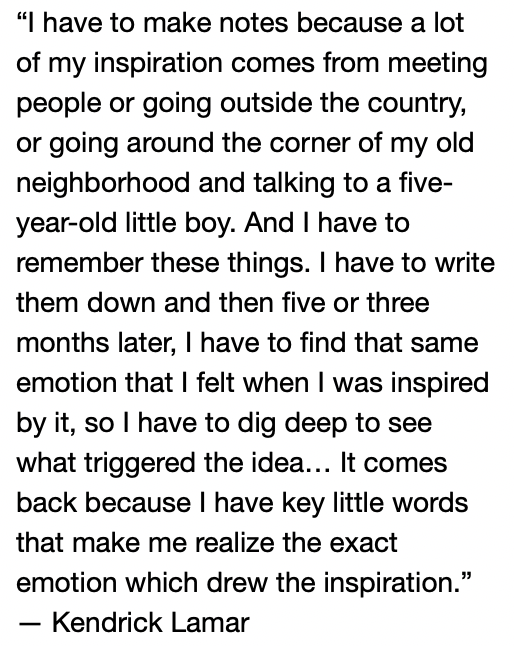
If you want to improve your writing, start by becoming a better note-taker.
Here are 10 ways to do that:
1. Save only the best notes: Don't hoard information. Save your top 5-10% of ideas only. That way, you can trust that everything in your note-taking system is high-quality.
Here are 10 ways to do that:
1. Save only the best notes: Don't hoard information. Save your top 5-10% of ideas only. That way, you can trust that everything in your note-taking system is high-quality.
2. Create evergreen notes.
Like a good investment, the benefits of your note-taking system should compound in value. Save ideas that will stay relevant for many years. Read the classics, skip the news. Note-by-note, brick-by-brick you’ll build an intellectual Coliseum.
Like a good investment, the benefits of your note-taking system should compound in value. Save ideas that will stay relevant for many years. Read the classics, skip the news. Note-by-note, brick-by-brick you’ll build an intellectual Coliseum.
3. Publish regularly.
Writing more is the fastest way to improve your note-taking system. Without the pressure to produce, your system will become messy. The pressure to produce will turn your note-taking system into an extension of your mind.
Writing more is the fastest way to improve your note-taking system. Without the pressure to produce, your system will become messy. The pressure to produce will turn your note-taking system into an extension of your mind.
https://twitter.com/david_perell/status/1242544793651036160?s=20
4. Be Lazy.
Your note-taking system doesn’t have to be perfect. There is only one way to measure the value of a note-taking system: how much does it help you produce? Lower your standards for note-taking, so you can raise your standards for creation.
Your note-taking system doesn’t have to be perfect. There is only one way to measure the value of a note-taking system: how much does it help you produce? Lower your standards for note-taking, so you can raise your standards for creation.
5. Research happens in the background.
In school, we’re taught to research before we write. Do the opposite. Compile notes over time. Then, once you have an idea, start writing immediately — right when you have an epiphany. Start researching after you've written a draft.
In school, we’re taught to research before we write. Do the opposite. Compile notes over time. Then, once you have an idea, start writing immediately — right when you have an epiphany. Start researching after you've written a draft.
6. Link notes together.
Organize your ideas by topic, not by source. As you browse your note-taking system, consider the serendipity you want to create for your future self. For example, if you read two books about a topic, link those notes together.
Organize your ideas by topic, not by source. As you browse your note-taking system, consider the serendipity you want to create for your future self. For example, if you read two books about a topic, link those notes together.
https://twitter.com/david_perell/status/1234627971648040960?s=20
7. Note-taking is a form of time-travel.
You don’t just take notes to remember ideas. You also take notes to remember experiences. Reading your notes takes you back to a different state of consciousness. Note-taking is a rebellion against the entropy of memory.
You don’t just take notes to remember ideas. You also take notes to remember experiences. Reading your notes takes you back to a different state of consciousness. Note-taking is a rebellion against the entropy of memory.

8. The ultimate goal of note-taking is to improve your ideas.
Too many people treat note-taking as an end in itself. But the goal of note-taking isn’t to save information. It’s to have ideas you wouldn’t have had otherwise. To be smarter, faster, and more creative.
Too many people treat note-taking as an end in itself. But the goal of note-taking isn’t to save information. It’s to have ideas you wouldn’t have had otherwise. To be smarter, faster, and more creative.
9. Practice Instant Outlines.
Build a strong foundation for your note-taking system and start collecting notes. Soon, you’ll be able to outline an essay in less than 30 minutes. Here’s what my outlining process looks like.
Build a strong foundation for your note-taking system and start collecting notes. Soon, you’ll be able to outline an essay in less than 30 minutes. Here’s what my outlining process looks like.
10. Keep things messy.
Your note-taking system should encourage serendipity. If the divisions inside your system are too clean, you can’t make unexpected connections between ideas — which is the ultimate goal of a note-taking system. Ditch perfection. Embrace randomness.
Your note-taking system should encourage serendipity. If the divisions inside your system are too clean, you can’t make unexpected connections between ideas — which is the ultimate goal of a note-taking system. Ditch perfection. Embrace randomness.
If you're interested in these ideas, I just published a series of short podcasts with @fortelabs — the king of note-taking.
We talked about intermediate packets, writing from abundance, and why you should keep your ideas moving.
podcasts.apple.com/us/podcast/the…
We talked about intermediate packets, writing from abundance, and why you should keep your ideas moving.
podcasts.apple.com/us/podcast/the…
If you're interested in note-taking, you should follow @andy_matuschak.
Here's what he taught me:
∙ Outline while you research
∙ Collecting notes feels more useful than it usually is
∙ Shorter cycles of research and writing are better than long ones
notes.andymatuschak.org/%E2%80%9CBette…
Here's what he taught me:
∙ Outline while you research
∙ Collecting notes feels more useful than it usually is
∙ Shorter cycles of research and writing are better than long ones
notes.andymatuschak.org/%E2%80%9CBette…
• • •
Missing some Tweet in this thread? You can try to
force a refresh



